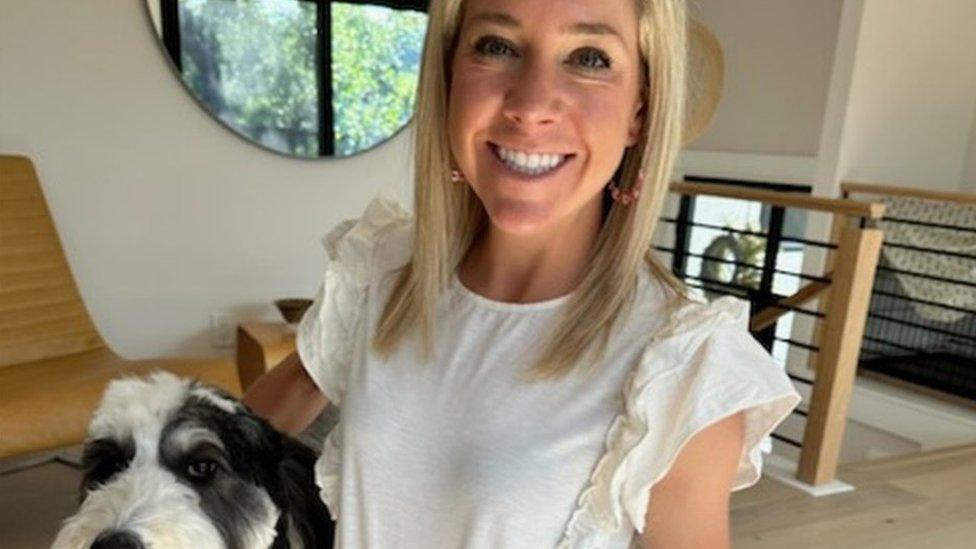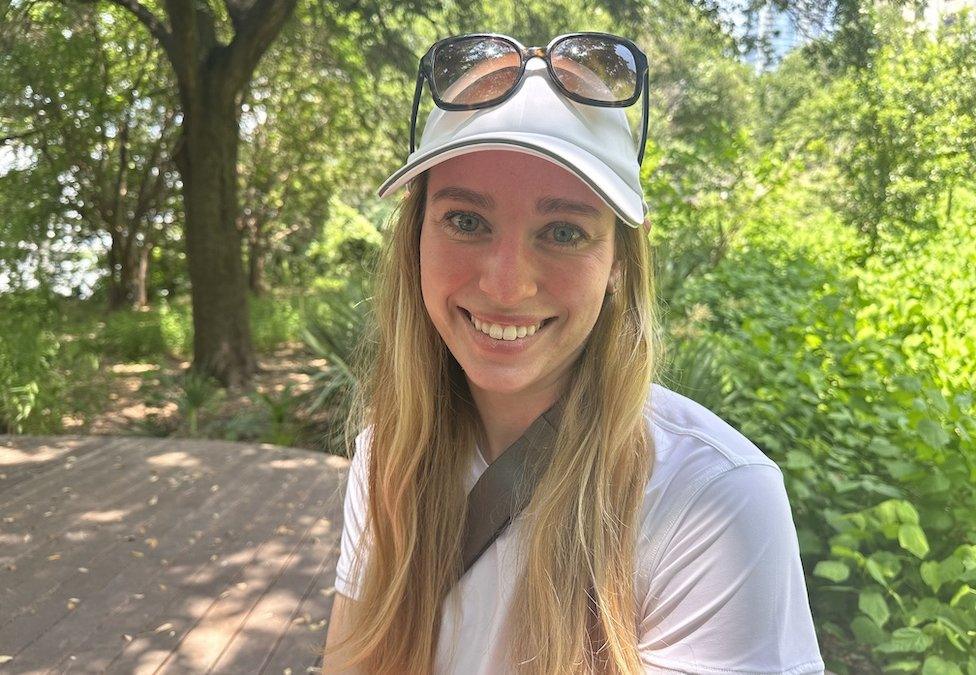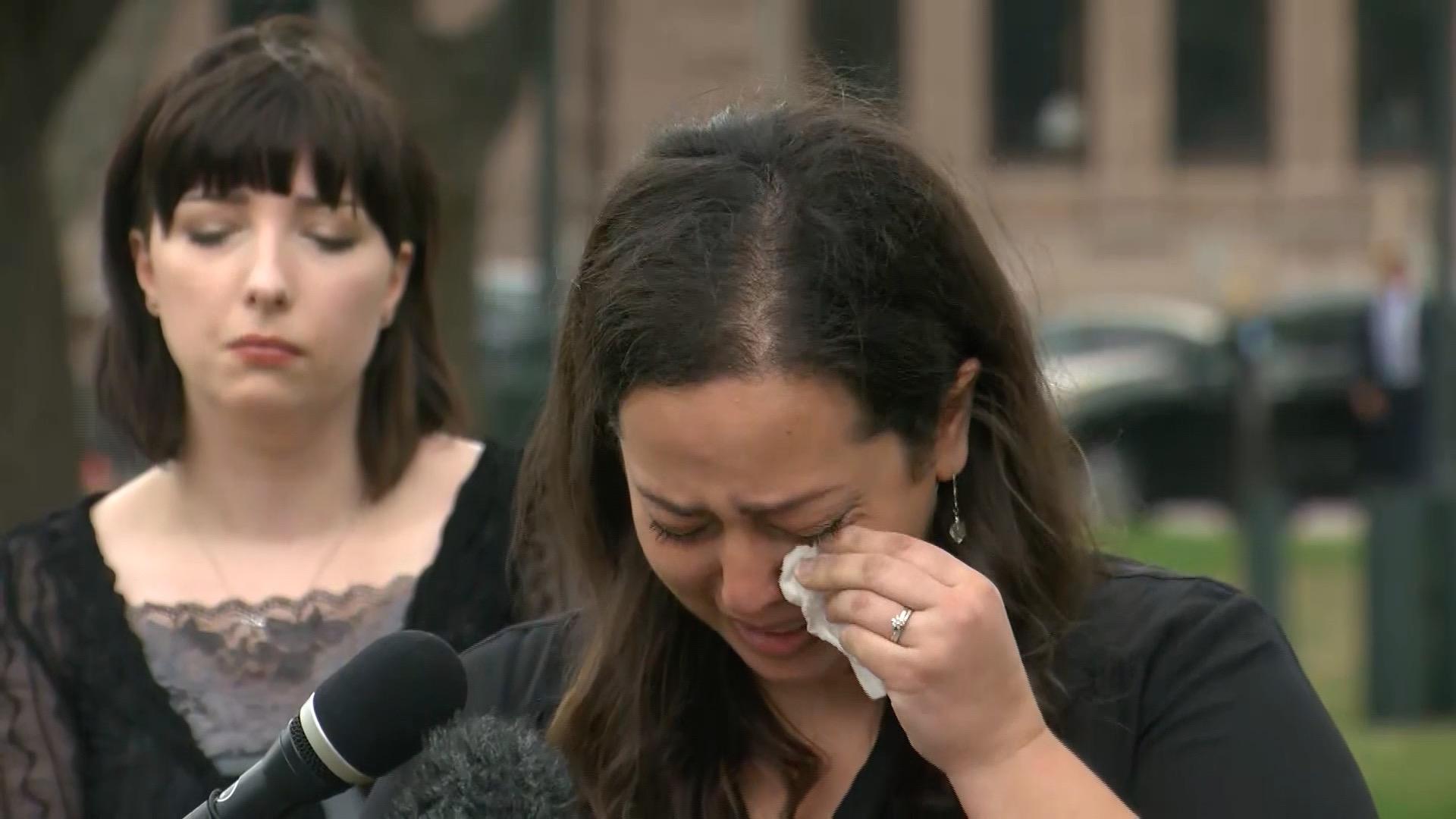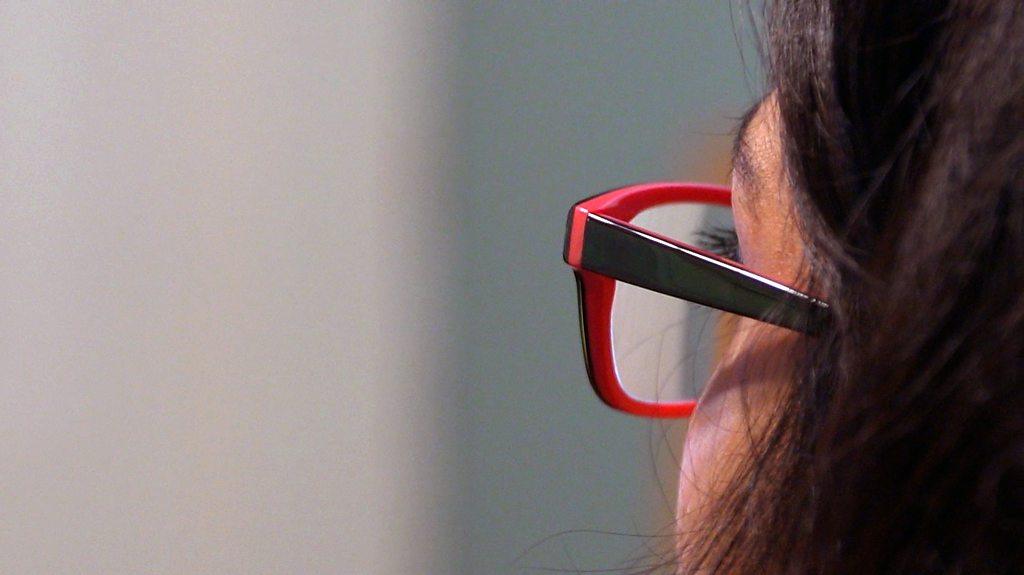She was denied an abortion in Texas - then she almost died
- Published

Amanda Zurawski says Texas's abortion bans are "dystopian"
A Texas law that bans all abortions except in dire medical circumstances is one of the strictest introduced since the right to the procedure was overturned. Critics say it is forcing many women, and their doctors, to choose between breaking the law and making the right decision for their health.
Amanda Zurawski and her husband Josh had recently bought their dream home. Located in one of the most sought-after areas of Austin, Texas, it had scenic views of a lake and a golf course. With their first child on the way, it was perfect for their growing family.
But their moving day last August was not at all what they had envisioned. Amanda had just been discharged from the hospital after her life was put at risk when she was denied an abortion.
"It felt like I was living in a dystopian world," Amanda told the BBC. "In the United States, as a pregnant person, you should not be afraid of your life because of the laws."
In the year since the Supreme Court overturned Roe v Wade, giving states the right to ban abortion, 13 states have passed near total bans. Texas is the largest, and one of the strictest, banning all abortions from the moment of conception, except in cases of a "life-threatening physical condition" or "a serious risk of substantial impairment of a major bodily function". Breaking the law can carry a $100,000 (£78,000) fine and up to life in prison.
When Amanda learned she was having a daughter, she and her husband were overjoyed. But on the same day that she compiled the guest list for her baby shower, she was diagnosed with a condition that led to not only the loss of her child, but put her in the crosshairs of Texas's abortion ban.
Doctors told her she had cervical insufficiency, which is a weakening of the cervical tissue that causes premature dilation, and that her unborn daughter would not survive. She and her husband were devastated.
"She was a baby that we desperately, desperately wanted," she said.
Texas abortion law: 'I waited for my daughter to die so I wouldn't die'
A standard course of medical treatment for an unviable pregnancy at that stage of development is to terminate, and extract the foetus. Waiting to miscarry naturally can put the mother at risk for infection, which can prove fatal.
But doctors told her they couldn't terminate her pregnancy, as under the state's laws, it was a crime to perform an abortion when there was a foetal heartbeat, unless the mother's life was threatened. Essentially, the message was that she was not sick enough yet to legally justify an abortion.
Three days later, Amanda developed a life-threatening infection and went into septic shock.
"My teeth were chattering uncontrollably, I couldn't put together a sentence," she said. "Imagine when you have the worst flu you've ever had in your entire life, it was that times one thousand; it was awful."
At the hospital, they induced labour and she miscarried her baby, whom she named Willow. She was then immediately sent to the intensive care unit, where she spent the next several days. The sepsis had caused scarring on her uterus and fallopian tubes, which led to one tube being permanently blocked.
It may make conceiving even harder for her in the future.
Amanda is now one of 13 women, and two doctors, who have decided to sue the state of Texas in the hope of changing the ban, to give doctors more leeway in determining when an abortion is necessary.
The state has asked the judge to dismiss the case. On Wednesday, Governor Greg Abbott signed legislation that clarifies that doctors are allowed to use their "reasonable medical judgment" to prevent serious complications caused by ectopic pregnancies or pre-viable premature rupture of membranes, which was the cause of Amanda's sepsis.
Anti-abortion advocates and politicians who support the ban say that the Texas laws were always written clearly, but the new legislation will help make it more explicit.
"If a doctor can foresee that a woman has sepsis that could end up being life-threatening, they can act immediately," said Rebecca Parma, who leads anti-abortion research and advocacy for Texas Right to Life.
She also said that now that abortion has been banned, her group intends to advocate for increased social services to women and the extension of Medicaid, or free health insurance, up to a year after childbirth, to ensure that women's maternal health is not neglected.
But the Center for Reproductive Rights, which is funding the lawsuit on behalf of the women and doctors, said there was no list long enough to encompass all cases where an abortion might be medically necessary.
Their position mirrors that of the American College of Obstetricians and Gynaecologists, which says each patient brings unique medical considerations to the table.
Dr Leah Tatum, a fellow of the organisation, who treats patients at Austin Regional Clinic, says the laws in Texas are written in such an ambiguous way that they cause stress and anxiety for medical providers across the state, who fear being charged with a crime for providing their patients with medical care.
"I'm coming at this from an objective medical standpoint," she said. "A pregnancy has more risk to the patient that is carrying the pregnancy than an early termination would."
"At what point by the law are they considering the patient's life at risk?"
Medicine is not black and white, she said, and cases that fall in the grey are more difficult to interpret within the law. While she is part of a big practice, with lawyers on hand to give advice, she worries for providers who don't have that same support system, particularly in rural areas.
"This is so different from how we were trained and what the national standard is for maternal care," said Dr Judy Levison, a Houston doctor who has been practising for four decades. But she's decided to stop seeing patients, partially because of these bans, and is now one of two doctors who are plaintiffs in the lawsuit against the state.
She mostly saw low-income patients, and she felt she was being asked to practice medicine in an unethical way.
"Where were they going to get an abortion? How were they going to afford travelling, getting childcare, risking two days not working and risking their employment perhaps? I suddenly felt like my hands had been tied behind my back," she said.
And although the law, and the recent legislation clarifying the law, makes exceptions for when the mother's life is threatened, Texas does not allow abortions in the case of lethal foetal abnormalities, which are medical problems that make the foetus unlikely to survive upon birth.
Taylor Edwards, who is also a plaintiff in the lawsuit, said that because there was no exception, she was forced to leave Texas for an abortion to terminate her unviable foetus.
"The emotional torture of those two weeks cannot be understated. I don't know how to explain to people how absolutely terrible it is knowing you're carrying around a baby that isn't going to live and you have to be very visibly pregnant," she said.
She is not the only one who has made the decision to leave the state to obtain an abortion. Many have had to travel hundreds of miles to Kansas or New Mexico, sometimes calling a dozen or more facilities to schedule their procedure, says Dr Kari White, of the Texas Policy Evaluation Project at the University of Austin.
"This was a really emotionally difficult experience for people, not because they were getting an abortion but because they were unsure whether or not they could get one," she told the BBC.

Taylor Edwards said she was "made to feel like a criminal" for leaving the state to have an abortion she said was medically necessary

Like Amanda, Taylor also went through fertility treatments, spending tens of thousands of dollars to conceive, and found out in her second trimester that her daughter Phoebe would not survive.
At her 17-week anatomy scan this past February, the doctor saw the baby's brain matter herniating out of her skull, a condition known as encephalocele. Taylor recalled the moment when the doctor told her that the baby would not survive: "I just started screaming, I don't know what took over me."
She did not want to have to carry her daughter to term, only to give birth to a stillborn baby. But the cost and stress of having to leave the state took a psychological toll on her as well.
Three hours before she was due to fly to New Mexico, the clinic said they had run out of the necessary medication for the procedure. She eventually got an appointment later in Colorado, barely making their 19-week cut-off, after which they would no longer perform the procedure.
In total, the flights, hotel and abortion cost her $6,000 and was not covered by insurance, she said.
"You shouldn't have to deal with it when you're going through the worst experience of your life," she said.
"And then to be thrust into a situation where you're made to feel like a criminal is even worse."
As for Amanda, after losing Willow and moving into their home in Austin, she and her husband discovered that a tree outside their new home was a desert willow. Every morning they say hello to it, feeling their daughter is close by. Along with the Edwardses, they have started another round of fertility treatment, hoping to have another child.
As the one-year anniversary of the fall of Roe v Wade draws near, both women say they are hopeful - but ready to fight.
"When I look back on the last year and everything that's happened to me personally but also in our political landscape, I see a lot of people mobilising," Mrs Zurawski said. "I've said before I don't think there's anything more powerful than a pissed-off mum and you got a lot of pissed-off mums right now."
Related topics
- Published2 May 2023

- Published8 March 2023

- Published10 August 2022
